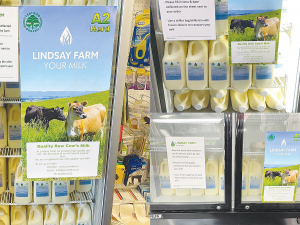NZ Catchment Groups Thrive with ‘Source to Sea’ Approach
The most successful catchment groups in NZ are those that have 'a source to sea' approach.
 Registered provider of raw milk, Lindsay Farm is recalling product after the detection of Campylobacter. Photo: Facebook
Registered provider of raw milk, Lindsay Farm is recalling product after the detection of Campylobacter. Photo: Facebook
Raw unpasteurised drinking milk from Central Hawke's Bay producers Lindsay Farm is being recalled following the detection of Campylobacter.
The Ministry of Primary Industries says Lindsay Farm is a registered provider of raw milk.
The recall affects Lindsay Farm brand drinking milk, sold in the Hawke's Bay region at eight registered depots and via home deliveries. The product is sold in 2-litre plastic bottles.
Campylobacter bacteria can cause severe gastroinstestinal illness in people, and can be particularly serious in young people, the elderly, pregnant women and people with weakened immune systems.
New Zealand Food Safety's national food compliance services manager, Melinda Sando, says people with Lindsay Farm organic raw drinking milk at home should check if it is among the batches of recalled product.
"If you have any of the recalled product, throw it out or return it to your supplier, or heat to 70°C and hold at this temperature for one minute. If you don't have a thermometer, heat the milk until it nearly reaches a boil (or scald the milk) before drinking it.
"Raw milk is inherently more risky than pasteurised milk because the process of pasteurisation kills harmful bacteria. You can get sick from consuming raw milk. If you have health concerns after drinking the product, seek medical advice."
Campylobacter symptoms include muscle pain, headache and fever followed by watery or bloody diarrhoea, stomach pain and nausea. Symptoms typically develop 2 to 5 days after infection and last 3 to 7 days.
In people with weakened immune systems, such as those with a blood disorder, with AIDS, or receiving chemotherapy, Campylobacter occasionally spreads to the bloodstream and causes a life-threatening infection.
Human campylobacteriosis is a notifiable disease in New Zealand. That means any cases must be reported to public health authorities.
Voting has started for the renewal of DairyNZ's milksolids levy.
The most successful catchment groups in NZ are those that have 'a source to sea' approach.
Associate Agriculture Minister and Manawatu dairy farmer Andrew Hoggard says the free trade agreement (FTA) negotiated with India is not a bad deal and his party, Act, will support it when it goes before Parliament.
Newly released data from Environment Canterbury (ECan) Farm Environment Plan (FEP) audits are showing a dramatic lift in environmental performance across the region.
A solid recovery of global dairy prices this year makes a $9.50/kgMS milk price almost a shoo-in for this season.
As New Zealand marks the United Nations’ International Year of the Woman Farmer 2026 (IYWF 2026), industry leaders are challenging the misconception that women only support farming.
OPINION: Fonterra may be on the verge of selling its consumer business in New Zealand, but the co-operative is not…
OPINION: What does the birth rate in China have to do with stock trading? Just ask a2 Milk Company.